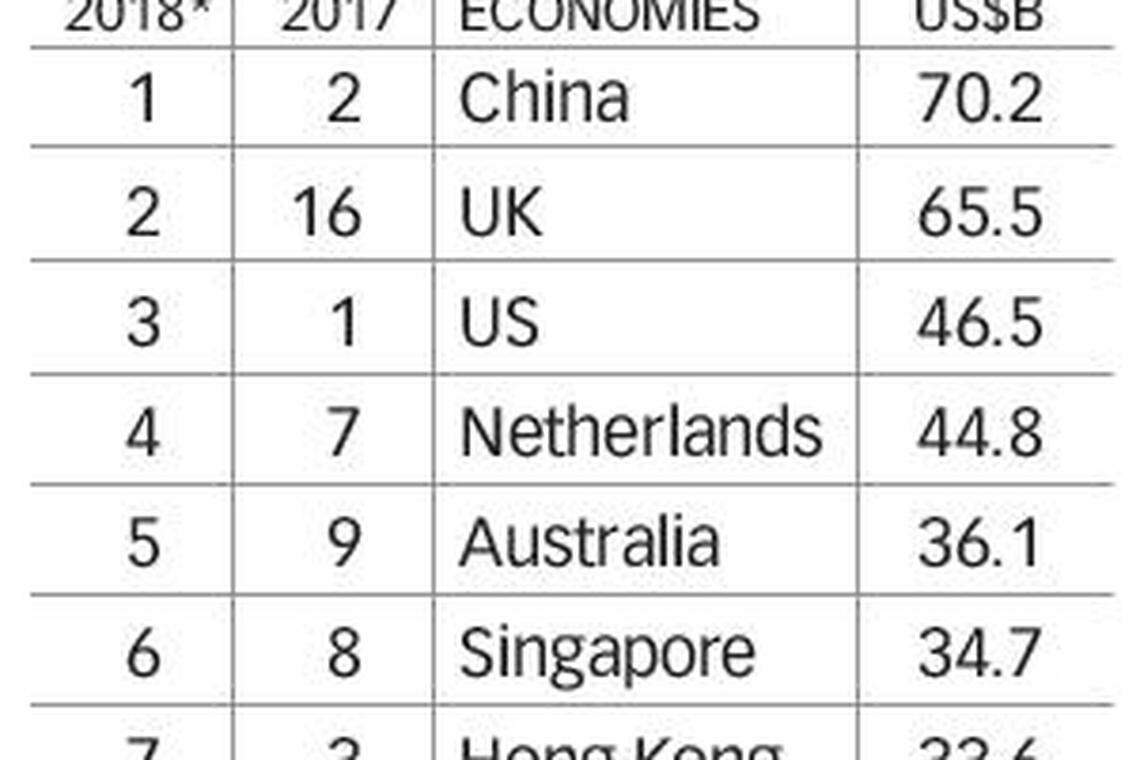Singapore bucks global trend; draws more investments in H1
Singapore
MULTINATIONAL corporations were still pumping more money into factories and offices in Singapore in the first six months of the year, even as they slashed global investments at the same time.
Some US$35 billion in foreign direct investments flowed into Singapore, driving FDIs in South-east Asia up 18 per cent over the first half of 2017 to US$73 billion in January-June this year, according to the latest Investment Trends Monitor published by the United Nations Conference on Trade and Development (UNCTAD).
The latest FDIs elevated Singapore from eighth to sixth in UNCTAD's top 10 FDI host economies. China moved up one notch to top the list, while the US slipped from first to third position. The UK made the most dramatic comeback, leaping from 16th to 2nd.
Global FDIs tumbled 41 per cent to an estimated US$470 billion in the first half of the year, due largely to the shift of retained earnings overseas back to the US after the Senate passed the Tax Cut and Reform Bill - the biggest in US history.
While the first half of last year saw US MNCs plough back US$147 billion in retained earnings abroad, this year they withdrew US$217 billion of their retained profits globally and moved the money back home.
US FDIs in Singapore fell US$34 billion in the first half because of the pull-back but, UNCTAD said, like some economies such as the Netherlands, FDIs in Singapore still increased despite US MNC divestments.
Global FDIs fell in the first half also because of "uncertainty about the implementation details of the reform, combined with uncertainty about trade relations and about more stringent investment screening procedures" in the US.
"Uncertainty caused by tensions in global trade may also have affected other regions that show negative growth in FDI."
The decline in global FDIs was largely concentrated in the developed economies, where FDIs plunged 69 per cent to an estimated US$135 billion - significantly depressed by negative inflows in Ireland (minus US$81 billion) and Switzerland (minus US$71 billion).
FDIs to developing economies in the first half dipped just 4.0 per cent - driven mostly by a 16 per cent fall in flows to East Asia - to an estimated US$310 billion, or two-thirds of global FDIs. The flows to developing Asia also slipped 4.0 per cent to US$220 billion, but Asia remained the biggest host region with 47 per cent of global FDIs.
Though global FDIs dropped in the first half, cross-border mergers and acquisitions stayed flat at US$371 billion. Greenfield projects - an indicator of future trends - bounced back to US$454 billion, up 42 per cent from relatively low levels in the first half of 2017.
"The stable value of global cross-border M&As and the significant increase in greenfield project announcements (the latter, although they have little or no impact on FDI in the same year, are an indicator of the willingness of firms to invest in productive assets) suggest that the drop in global FDI flows is mostly due to financial considerations (intra-firm financial flows)," UNCTAD said.
Net cross-border M&As targetting developing Asia in the first half were about the same level as in the first half of 2017 (US$41 billion), supported by 12 mega deals exceeding US$1 billion. Major M&A transactions were concluded in Singapore with over US$18 billion in total value, led by deals in the services sector.
Two of the three biggest deals were sealed here: Global Logistic Properties (US$11.5 billion) and Equis Energy Developments (US$5 billion). The other was Avolon Holdings (US$2.4 billion) in Hong Kong.

"The value of of greenfield FDI projects announced in the first half in Asia was at an all-time high," UNCTAD said. "This was due to a surge in greenfield project announcements in Southeast Asia, propelled by rising investment activity in Indonesia (US$28 billion), Vietnam (US$18 billion) and the Philippines (US$12 billion)."
For the rest of Asia, greenfield investment in the first half mostly rebounded from a relatively low level in 2017. Despite trade tensions, China drew the highest value of announced greenfield projects (US$41 billion).
BT is now on Telegram!
For daily updates on weekdays and specially selected content for the weekend. Subscribe to t.me/BizTimes
Economy & Policy
Gan Kim Yong visits US and Canada; to mark 20th anniversary of US-Singapore FTA
NTUC aims to do more to support PMEs, who now account for nearly half its membership
Daily Debrief: What Happened Today (Apr 25)
Singapore’s inflation eases more than expected in March, with headline inflation at 2.5-year low
8 in 10 firms in S-E Asia, Greater China positive about business environment: UOB survey
Flexi-work request guidelines not meant to prescribe blanket outcomes for employers or influence hiring of workforce: SNEF
